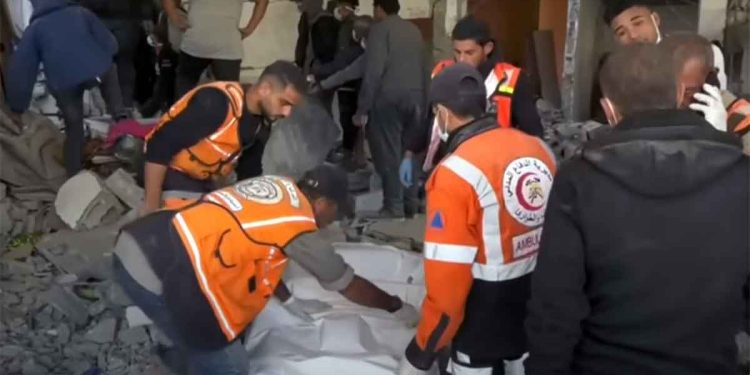On the third day of the ceasefire agreement in the Gaza Strip, civil defence teams continue to retrieve the bodies of the dead buried under the rubble, amid difficult conditions and a severe shortage of necessary equipment.
66 bodies were retrieved yesterday, bringing the number of bodies retrieved since the start of the truce to 137, according to the civil defence.
Field sources indicate that dozens of bodies of victims are still under the rubble, especially in the southern and northern border areas of the Strip.
Rescue teams are still facing great difficulties due to the widespread destruction, in addition to the systematic targeting of the infrastructure by the Israeli occupation, which hindered the arrival of ambulance and emergency teams during the war that lasted for nearly 15 months, and resulted in the killing of more than 46,000 Palestinians, including thousands of women and children. It also left comprehensive destruction throughout the Strip, which led to the collapse of the humanitarian and health system, and increased the suffering of the civilian population.
The Israeli occupation’s obstruction of the recovery of the bodies of the dead constitutes a serious violation of international humanitarian law, which emphasises the necessity of respecting the dead and ensuring their burial in a manner that preserves their dignity.
Article 16 of the Fourth Geneva Convention of 1949 and Article 34 of Additional Protocol I stipulate that the conflicting parties must be able to identify the dead and recover them without hindrance, however, the Israel occupation did the opposite.
During the war, rescue teams were prevented from reaching many targeted areas, especially in the eastern Gaza Strip and areas adjacent to the southern border.
Humanitarian crews were also directly targeted, resulting in the killing and wounding of dozens of civil defence personnel, in a flagrant violation of the protection of humanitarian workers.
Moreover, leaving the bodies of the dead under the rubble for long periods exacerbates health and environmental risks, especially in the densely populated Gaza Strip, as it leads to the spread of infectious diseases and pollution of water and the surrounding environment.
These crimes require the international community to assume its legal and moral responsibilities by holding the perpetrators of these crimes accountable and ensuring respect for international humanitarian law, as the continuation of these practices without accountability encourages the perpetrators to escape punishment and perpetuates the suffering of the Palestinian people.


























